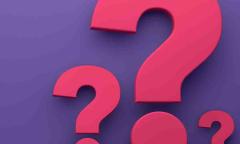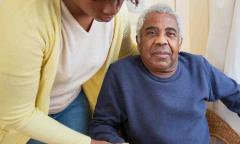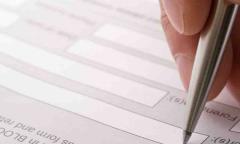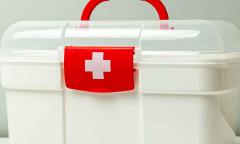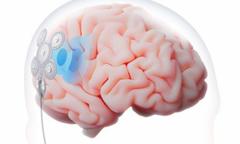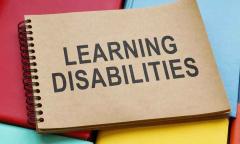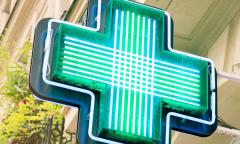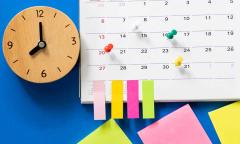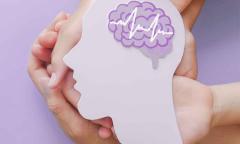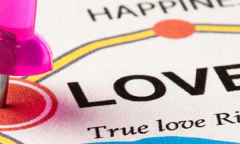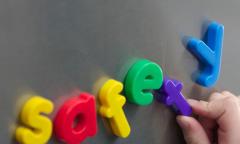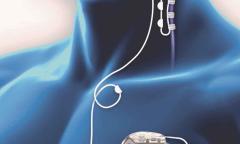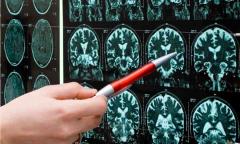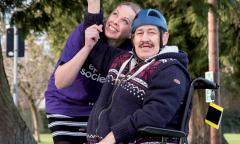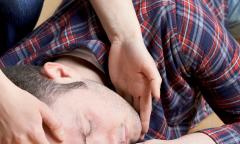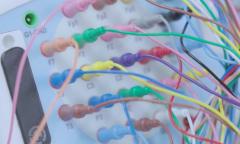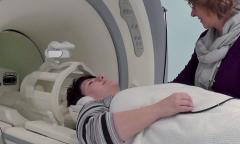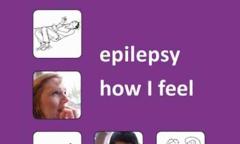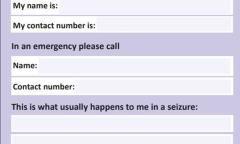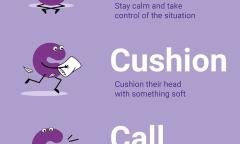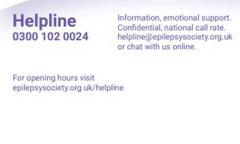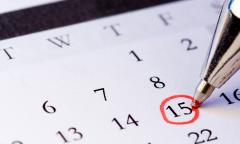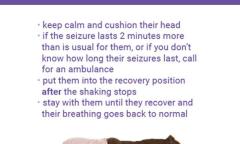For printed copies of our factsheets, please contact our helpline on 0300 102 0024 and someone from the team can support you.
A - G
Genetics and epilepsy
Information on how genetic factors influence health, disease risk, and inheritance patterns.
After a first seizure
Anyone can have a single seizure at some point in their life. For some people this can be a frightening and upsetting event.
Alcohol, drugs and epilepsy
The effects of consuming alcohol and drugs.
Anti-seizure medication
An introduction to anti-seizure medication.
Complementary therapies
Information about therapies that may help to promote wellbeing.
Carers
Being a carer for someone with epilepsy: what help is available and organisations that can help.
Epilepsy syndromes
An overview and details of some specific epilepsy syndromes.
Claiming benefits
Some of the benefits you may be eligible to apply for, depending on how your epilepsy affects you, and your financial situation.
Diet and Nutrition
Tips for helping you to follow a balanced diet and stay healthy.
Driving
Driving regulations and help with travel costs.
Driving regulation quick guide
Driving regulations for Group 1 driving licences (cars, motorcycles and mopeds) and includes a flow chart to help you find out how the regulations apply to you.
Employment
How epilepsy can affect work, legal protections under the Equality Act and Health and Safety law, reasonable adjustments, and practical guidance for employees and employers.
Epilepsy care pathway
A clear care pathway to show you what to do from the first seizure to referrals and reviews.
Epilepsy information for pharmacists
Our guide for pharmacists.
Epilepsy surgery
What epilepsy surgery involves, who can have surgery and pre-surgical tests.
Exercise and sport
How exercise can help relieve stress levels and improve overall health.
Facts about epilepsy
A list of facts and statistics about epilepsy.
Fasting
What effect does fasting have on epilepsy.
Finding support
Sources of help and support.
First aid for epileptic seizures
What to do if someone has a seizure.
Generic and branded ASMs
How to get the same version of your ASMs with each prescription.
EASEE device for epilepsy
EASEE® (Epicranial Application of Stimulation Electrodes for Epilepsy) is a new device to reduce the number of seizures for people with drug-resistant focal seizures.
Children
A guide for parents and teachers.
Anxiety
Everyone feels anxious at times. When you are frightened or feel threatened, your heart beats faster, your muscles tense and your body prepares you to ‘fight’ the threat, or to run away from it – ‘flight’.
Depression
Depression can be more likely in someone with epilepsy for various reasons, but this does not necessarily mean that one condition has caused the other.
Epilepsy Information for GPs
Information designed to help GPs to deliver healthcare to people with epilepsy.
Diagnosis
Getting a diagnosis is not always easy because there is no single test that can diagnose epilepsy.
H-R
Isolation and loneliness
Everyone can feel lonely from time to time, and this is part of being human. But when people feel lonely most, or all of the time, research shows it can be harmful.
Non-epileptic seizures
Information about non-epileptic seizures.
Just diagnosed
How epilepsy might affect you.
Ketogenic diet
Information about a medical dietary treatment for some people with hard to control epilepsy.
Learning disability
Why and how often learning disabilities happen alongside epilepsy, and issues around behaviour.
Links between epilepsy and mood
Potential links between epilepsy and mood.
Making the most of your pharmacist
How your pharmacist can help you with your epilepsy.
Memory
Some of the issues around epilepsy and memory, and what might help.
Monitoring your medication
Details about therapeutic drug monitoring.
Photosensitive epilepsy
How flashing lights and patterns can trigger seizures, who is most at risk, and practical ways to reduce exposure and help manage the condition.
Recording seizures
Information to help a doctor to confirm a diagnosis or identify the type of seizures someone is having.
Recovery position
How to put somebody in the recovery position after their seizure has stopped.
Relationships and sex
How epilepsy can affect your relationships.
Parenting with epilepsy
If your seizures (or your partner’s) are controlled, then epilepsy may not affect how you look after your child. However, parents who have seizures may find taking extra safety measures helpful.
Information for colleges and universities
Finding out more about a student’s epilepsy, and their seizures, can help you to better understand how it affects them, and what help and support might be useful for them.
S-Z
Young People
A guide for young people with epilepsy.
Safety and risk
Information on how to manage safety and risk for those with epilepsy.
Sleep
Information on the complex relationship between epilepsy and sleep.
Stress
This factsheet looks at the links between stress and epilepsy.
SUDEP
Information on SUDEP, as well as the risk factors and how to reduce your risk.
Travel and holidays
Some ideas to consider if you are planning to travel.
VNS (Vagus Nerve Stimulation) therapy
How VNS therapy works, who it may help and side effects.
What help is available?
Details of free prescriptions, benefits, travel costs, and help from social services and for carers.
What is epilepsy?
Epilepsy is a neurological condition where there is a tendency to have seizures that start in the brain.
Yellow card scheme
How to report side effects not listed on the patient information leaflet that comes with your medication.
Your appointment or review
Suggested topics that you may want to cover in your epilepsy review with your GP or neurologist.
Seizures
Information covering different types of epileptic seizures and what they can look like.
Women and girls
How epilepsy affects women and girls.
Starting a family
This information looks at the issues around pregnancy that may affect some people with epilepsy.
Sodium Valproate
Sodium valproate is an effective anti-seizure medication (ASM), and for some people with epilepsy it is the only medication that controls their seizures
Easy read
Our 'About epilepsy pack' includes 9 booklets written with and for adults with learning disabilities, using photos, symbols and large text. Includes 'Epilepsy', 'Having an MRI' and 'Taking your medication'. (Updated 2025)
For a printed copy of this pack please contact our helpline on 0300 102 0024.
What is epilepsy? (1/9)
What is epilepsy?
Epileptic seizures (2/9)
Information about different types of seizures and how they may affect people with epilepsy.
Living with epilepsy (3/9)
Information about living with epilepsy.
Keeping safe (4/9)
Information about how to keep yourself safe living with epilepsy.
Taking your medication (5/9)
Information about taking your medication.
Going to see your doctor (6/9)
Information about seeing your doctor.
Having a blood test (7/9)
Information about having a blood test.
Having an EEG (8/9)
Information about having an EEG.
Having an MRI (9/9)
Information about having an MRI.
How I feel
An easy read leaflet about epilepsy and mood. Uses large text, pictures and stickers.
For a printed copy, call the helpline on 0300 102 0024.
Factsheets
Factsheets on Epilepsy care and University for students with epilepsy.
Epilepsy care - Your rights
'Epilepsy care - Your rights' includes 13 factsheets explaining your rights and choices with regard to your epilepsy care and treatment.
Early access to specialist diagnosis and care (1/13)
Our ‘Epilepsy care – your rights’ factsheets explain your rights and choices with regard to your epilepsy care and treatment.
Choice of care (2/13)
When you are referred to a consultant, you have the right to choose where you go (such as the hospital you go to). This does not include going to Accident & Emergency.
Referral to tertiary care (3/13)
Tertiary care is provided by specialist hospitals or units that focus on specific care for different conditions. You will need a referral from either your GP (primary care) or your local hospital or clinic (secondary care).
Appropriate treatment and consistent medication (4/13)
If your treatment is available on the NHS, you have a right to access this treatment. No one can deny you this right on unreasonable or discriminatory grounds.
Involvement in your own healthcare (5/13)
You should be as involved as you want to be in all discussions and decisions about your health and epilepsy management. Your healthcare professionals should make sure you have the information you need at the time you need it, and that it is given in a way that is useful for you so that you can understand how it affects you individually.
Your care plan/review (6/13)
When you are discussing a treatment plan with your specialist, they will identify the treatment best suited to your epilepsy and seizures. For example, some anti-seizure medications (ASMs), work better for certain types of seizures than others.
Access to your health records (7/13)
Since 2016, your GP has been able to give you electronic access to your own GP records. If, for some reason, you are unable to access your records, you can write to your GP to ask to see them.
NHS Dental care (8/13)
Anyone whose dentist thinks they need dental treatment that is clinically necessary, has the right to have this treatment done on the NHS.
Free prescriptions (9/13)
You are entitled to free prescriptions for your anti-seizure medication (ASM) and for any other prescriptions you have. This is referred to as ‘medical exemption’ from paying prescription charges.
Health and social care assessment/benefits (10/13)
You can ask your local social services for a health and social care assessment (sometimes called a ‘needs assessment’) to see if you are eligible for help with care or support.
Freedom from discrimination (11/13)
You have a right to be treated with dignity and respect and to not be discriminated against.
The right to complain (12/13)
You have a right to complain about NHS services or treatment.
Your responsibilities (13/13)
You have responsibilities as well as rights.
University for students with epilepsy
'University for students' includes 5 factsheets explaining the practicalities of University for students with epilepsy, and what support you might need.
Feelings and emotional issues
Let’s be honest, you probably didn’t plan on your university suitcase having ‘epilepsy’ in it. Having epilepsy is more than just having seizures. It can affect every part of your life and every aspect of you: physical, mental and emotional.
How epilepsy can affect learning and the university experience
There are lots of things you could think about doing to reduce any impact epilepsy may have on your learning and university life. You might have lots of ideas of your own about what is best for you or it may be worth speaking to your university's disability advisor to see what help they can offer.
Deciding to go to university
Thinking about applying to university? Information to help you decide whether university is a practical option and guidance about the support that universities offer.
Practicalities of going to university
So, you’ve decided you’re going to university, and selected your course. What next? Planning ahead for the practical things will help to make going to university as straightforward as possible.
Social issues, lifestyle, and epilepsy
University can be an exciting time offering many opportunities both socially and academically and it is a time when you can build your independence. Whatever your hopes and expectations, making epilepsy just a part of your life may help you to get the most out of your experience at university.
Alternative resources
'I have epilepsy' ID card
Printable Identity card with basic first aid guidance, details about your seizures and emergency contacts.
For a printed copy, call the helpline on 0300 102 0024.
Calm, Cushion, Call Poster
Download our free "Calm, Cushion, Call" poster and display it in a prominent place such as a school, workplace, surgery or library, as long as you have permission.
Helpline Card
Contact details for our confidential helpline.
For a printed copy, call the helpline on 0300 102 0024.
Seizure diary
Includes a page to note medication changes, side effects, and a summary to show your doctor.
First aid card
Step-by-step first aid for seizures.
For a printed copy, call the helpline on 0300 102 0024.


